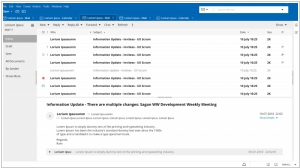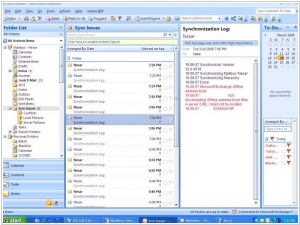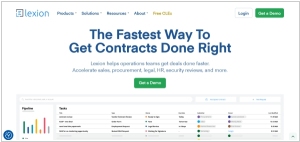HLC Notes vs Microsoft Exchange
September 16, 2023 | Author: Adam Levine
See also:
Top 10 Email Servers
Top 10 Email Servers
HCL Notes and Microsoft Exchange are both widely used email and collaboration platforms, but they have significant differences in their offerings and capabilities. HCL Notes, formerly known as IBM Notes, is a comprehensive collaboration suite that includes email, calendar, document sharing, and instant messaging functionalities. It focuses on providing a secure and integrated environment for enterprise-level communication and collaboration, making it suitable for large organizations seeking a robust and scalable solution. On the other hand, Microsoft Exchange is a part of the Microsoft Office 365 suite and is a widely used email server that offers advanced email and calendar management features. It is well-integrated with other Microsoft products, such as Outlook and SharePoint, providing a seamless experience for users already using the Microsoft ecosystem. Microsoft Exchange is popular among businesses of all sizes, offering reliability, scalability, and extensive integration options.
See also: Top 10 Email Servers
See also: Top 10 Email Servers
HLC Notes vs Microsoft Exchange in our news:
2018. IBM sold Lotus Notes/Domino, Websphere Portal and other software to HCL
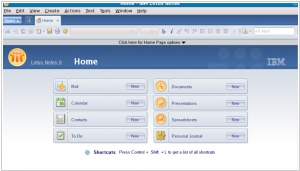
IBM is in the process of selling its renowned enterprise collaboration software, Lotus Notes, to the Indian company HCL for $1.8 billion. These products have been a significant component of IBM's enterprise business for a considerable period. However, last year, IBM began divesting the development segment to HCL while retaining control over sales and marketing. With the platform's development now outside of IBM's purview and the need for funds after a $34 billion expenditure on Red Hat, it appears that IBM decided it was no longer viable to retain any part of Lotus Notes in-house. On the other hand, HCL recognizes an opportunity to further develop the Notes/Domino business and is seizing it through this acquisition. HCL's interest in Notes/Domino surpasses what IBM has shown over the past decade, as they are heavily investing in rejuvenating the brand. Notes and Domino still maintain a presence in various enterprise sectors, particularly in EMEA (Europe, Middle East, and Africa). This strategic move aligns with IBM's shift towards advancing its cloud business in a different direction. The acquisition of Red Hat in October, in particular, demonstrates IBM's focus on embracing private and hybrid cloud deployments, whereas older software like Lotus Notes and Domino have limited relevance in this new realm.
2018. Microsoft released Exchange 2019, but no way to deploy it

Microsoft has recently launched a fresh iteration of its email and collaboration server, Exchange 2019. Although the update is available for download, there is a hindrance—installation is currently impossible. The reason being that it exclusively operates on the server operating system Windows Server 2019, which is yet to be released. In terms of Exchange 2019's innovations, they primarily revolve around enhancing system performance. The latest version has the capacity to utilize up to 48 processor cores and 256GB of RAM, with optimizations specifically tailored for SSD drives. It is evident (and Microsoft openly acknowledges this fact) that Exchange is being developed with a primary focus on large and exceedingly large enterprises. Consequently, Microsoft aims to transition small and medium-sized businesses to their cloud-based offering, Microsoft Office 365, which delivers email server functionality as a service.
2013. IBM kills Lotus. Microsoft kills SharePoint
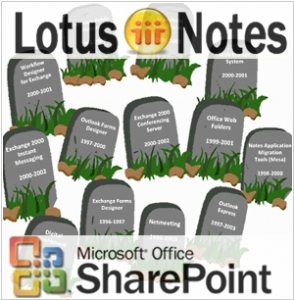
Perhaps the two most famous brands in the history of enterprise software, Lotus and SharePoint, will soon disappear. We mean brands, not specific products. Because by renaming their products, vendors try to erase the association with outdated technologies in customer brain. For example, Lotus appeared back in the 80-s years of last century. In 1995 IBM acquired Lotus Development and began selling their products Lotus Notes/Domino. In the following years most IBM collaboration systems moved under the Lotus umbrella. But last year the revolution occurred. The last child of the Lotus family - SaaS suite LotusLive was renamed to SmartCloud for Social Business. And then the name Lotus was removed from other products. The final nail was the recent launch of Notes/Domino 9.0 Social Edition (without Lotus). ***
2010. IBM unveiles SaaS version of Lotus Domino
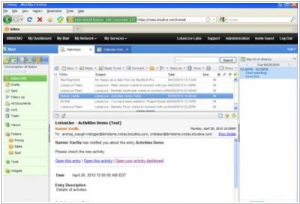
Companies like IBM and Microsoft love to confuse their customers with numerous services and titles. Not so long ago IBM launched the new mail service LotusLive iNotes, that costs $3 per month per user and provides corporate e-mail, contacts and calendar. And today IBM has unveiled another service called LotusLive Notes, that costs $5 per month and also includes e-mail, contacts and calendar. At first glance, the only difference is the price, but in fact the latest service is a multitenant SaaS version of Lotus Domino (Domino - is the name of server software in the traditional in-house Lotus Notes system). How it differs from LotusLive iNotes? ***
2010. Lotus Notes also becomes social
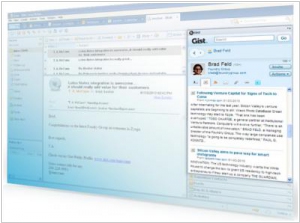
The widely used enterprise email client, MS Outlook, already incorporates a range of Enterprise 2.0 tools. It has integrated features for social networking (Xobni and Outlook Social Connector), Google Apps, Google Docs (Harmony), Remember the Milk, and more. With Outlook's ecosystem already quite diverse, developers have turned their attention to the second most popular enterprise email client, Lotus Notes. As a result, a new plugin and service called Gist has emerged, fulfilling a similar role for Lotus Notes as Xobni does for Outlook. Gist enables users to view the social profiles of their communication partners. It retrieves the latest information about individuals from Facebook, LinkedIn, and Twitter, as well as recent news about their companies from blogs and news sites. Additionally, the plugin presents all relevant correspondence and file exchanges with selected contacts in a convenient format. It's worth noting that Gist is also compatible with Outlook, GMail, iPhone, and can be accessed as a web service.
2010. Google Apps making Microsoft nervous

Recently, Google released the next anti-microsoft tool - Google Apps Migration for Microsoft Exchange, the plugin which allows you to easily move mail, calendars and contacts from Exchange to Google Apps. Last year they released the utility that syncs Outlook with Google Apps, but now you can import data directly from the Exchange server. Previously, Microsoft just ignored such events, or commented that Google Apps - is just a toy that no serious company will use. But Google's constant pressure is making them nervous. Microsoft recently launched the channel on Youtube, which contains videos explaining why MS Office products are better than Google's. For example, here's the video Exchange vs GMail: ***
2010. Project Vulcan - the future of IBM Lotus

The geek-developer dream comes true: a full-on collaboration environment with an open API and a name right out of Star Trek. Today at the Lotushpere conference IBM unveiled Project Vulcan - the new cloud platform for collaboration and social tools, that is already compared to Google Wave. But unlike Google Wave, Vulcan - is not a separate application, but an integrated environment for all future and existing Lotus apps, including Lotus Notes and LotusLive. Vulcan will be available to developers in the second half of 2010, and meanwhile it will be available to LotusLive Labs team, which has already shown 4 new projects for LotusLive: ***
2010. IBM LotusLive sets a new SaaS record, outgoes MS Exchange

IBM has recently secured a contract with Panasonic, which entails that 300,000 employees of the company will utilize the LotusLive SaaS services encompassing email, calendar, web-conferencing, messaging, and file storage. This deployment surpasses the scale of both Google and Salesforce. Undoubtedly, this deal will invigorate the SaaS market and bolster confidence in the SaaS model, particularly given the fact that Panasonic is transitioning from Microsoft Exchange to a SaaS system. Although we were not particularly impressed with LotusLive and its email service, LotusLive iNotes, the Japanese powerhouse deemed it a superior choice compared to Exchange and Google Apps. The decisive factors behind this decision appear to be the cost (LotusLive starting from $3 per user per month) and the reputable IBM brand.
2009. Exchange 2010 - unified messaging in the Cloud

Microsoft officially released the new version of its enterprise email server Exchange Server 2010. It's desktop client Outlook 2010 will appear only next year together with other Office 2010 applications. What is the most interesting about Exchange 2010? First, thanks to Windows Server 2008 R2 and Windows 7 (details here), and some new features in the new version, Exchange 2010 is now completely adopted for the cloud deployment. Of course, Hosted Exchange 2007 has been already provided for some years, but the latest version is much more secure, reliable and suitable for administration, when installed on the remote server (or in data-center). ***
2009. Google unveils Lotus Notes migration tool
Today, Google Apps has introduced a new capability that enables users to migrate from IBM's Lotus Notes, a popular enterprise productivity app. This syncing tool empowers customers to seamlessly transfer their email, calendar, and contacts from Notes to Google Apps. The installation and configuration process for multiple users can be completed in under 30 minutes. The migration is user-friendly, allowing users to continue using Notes without any downtime during the migration process. Furthermore, customers have the flexibility to migrate multiple offices simultaneously or individually, and centralized event logging facilitates efficient management and monitoring of migrations across various Domino servers and sites. Google emphasizes that the significant portion of the business email market, approximately 17%, currently utilizing Lotus Notes, can achieve substantial cost savings by transitioning to Google Apps.

